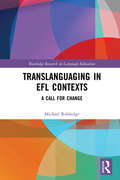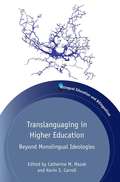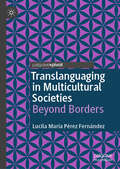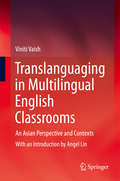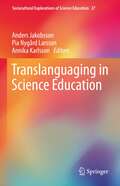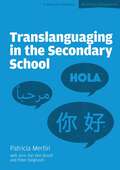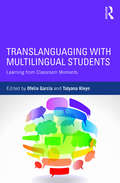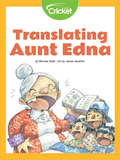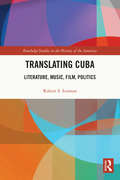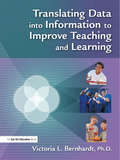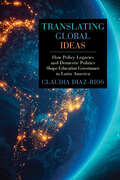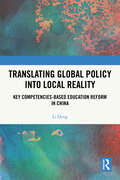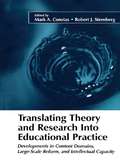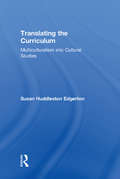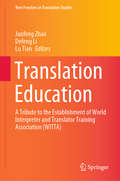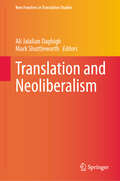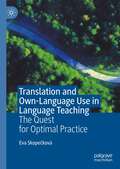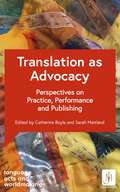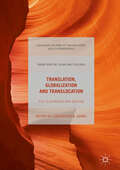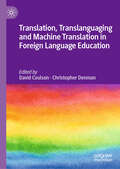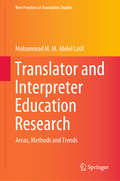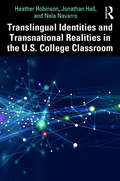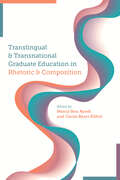- Table View
- List View
Translanguaging in EFL Contexts: A Call for Change (Routledge Research in Language Education)
by Michael RabbidgeThe purpose of this book is to promote the value of translanguaging in EFL teaching contexts. To date, translanguaging has been discussed mostly in regards to US and European contexts. This book will examine the teaching beliefs and practices of teachers within a South Korean elementary school context to evaluate the practices of current teachers who use translanguaging strategies when teaching. This examination utilizes sociological theories of pedagogic discourse to discuss the consequences of language exclusion policies on the peninsula. Using these theories, it presents an argument for why EFL contexts like South Korea need to reevaluate their current policies and understandings of language learning and teaching. By embracing translanguaging as an approach, the author argues, they will transform their traditional notions of language learning and teaching in order to view teachers as bilinguals, and learners as emerging bilinguals, rather than use terms of deficiency that have traditionally been in place for such contexts. This book's unique use of sociological theories of pedagogic discourse supports a need to promote the translanguaging ideology of language teaching and learning.
Translanguaging in Higher Education: Beyond Monolingual Ideologies
by Catherine M. Mazak Kevin S. CarrollThis book examines translanguaging in higher education and provides clear examples of what translanguaging looks like in practice in particular contexts around the world. While higher education has historically been seen as a monolingual space, the case studies from the international contexts included in this collection show us that institutions of higher education are often translingual spaces that reflect the multilingual environments in which they exist. Chapters demonstrate how the use of translanguaging practices within the context of global higher education, where English plays an increasingly important role, allows students and professors to build on their linguistic repertoires to more efficiently and effectively learn content. The documentation of such practices within the context of higher education will further legitimatize translanguaging practices and may lead to their increased use not only in higher education but also in both primary and secondary schools.
Translanguaging in Multicultural Societies: Beyond Borders
by Lucila María Pérez FernándezThis book delves into the multifaceted concept of translanguaging, offering a comprehensive examination from its foundational theories to its practical applications. The author provides a nuanced understanding of translanguaging, differentiating it from code-switching and elucidating its core premises, then explores translanguaging practices in early multilingual societies, colonial contexts, and postcolonial and globalized settings. Theoretical foundations are thoroughly explored in the second part of the book, covering sociolinguistic theories and their application to translanguaging, cognitive approaches emphasizing metacognition and cognitive flexibility, psycholinguistic perspectives, and sociocultural theories aligning with translanguaging. Part III examines practical aspects of translanguaging, focusing on its implementation in multilingual classrooms, multicultural communities, and professional settings. The book demonstrates translanguaging's role in community development, cultural heritage preservation, and fostering social cohesion through case studies in diverse contexts, including business, healthcare, and legal settings. Strategies and best practices for integrating translanguaging into language teaching are discussed, along with its benefits and challenges in education. The final section, Part IV, anticipates future directions for translanguaging, exploring emerging technologies such as virtual reality, augmented reality, artificial intelligence, and machine learning. The book also examines translanguaging's potential in linguistic preservation, particularly in the context of indigenous languages, as well as its role in achieving Sustainable Development Goals, including multilingual education and reducing linguistic inequalities. This book will be of interest to researchers, scholars, and educators interested in language studies, sociolinguistics, education, and interdisciplinary fields.
Translanguaging in Multilingual English Classrooms: An Asian Perspective and Contexts
by Viniti VaishThis book is the first to apply the theory of translanguaging to multilingual classrooms in an Asian context, offering strategies for teaching specific grammatical and comprehension skills to students struggling to read in English. It also enriches the methodology of coding bilingual transcripts with ideas resulting from a detailed analysis of a large and rich data set. Lastly, the author discusses growth areas in the emerging field of translanguaging and challenges for teachers implementing a translanguaging approach in a superdiverse classroom.
Translanguaging in Science Education (Sociocultural Explorations of Science Education #27)
by Anders Jakobsson Pia Nygård Larsson Annika KarlssonThis edited volume explores diverse translanguaging practices in multilingual science classrooms in Hong Kong, Lebanon, Luxembourg, South Africa, Sweden and the United States. It presents novel opportunities for using students’ home, first or minority languages as meaning-making tools in science education. It also invites to explore the use of language resources and other multimodal resources, such as gestures and body language. In addition, it discusses and problematizes contingent hindrances and obstacles that may arise from these practices within various contexts around the world. This includes reviewing different theoretical starting points that may be challenged by such an approach. These issues are explored from different perspectives and methodological focus, as well as in several educational contexts, including primary, middle, secondary levels, higher education, as well as in after-school programs for refugee teenagers. Within these contexts, the book highlights and shares a range of educational tools and activities in science education, such as teacher-led classroom-talk, language-focused teaching, teachers’ use of meta-language, teachers’ scaffolding strategies, small-group interactions, and computer-supported collaborative learning.
Translanguaging in the Secondary School
by Patricia MertinIn schools across the world, there are large numbers of students who are not native speakers of the language of instruction in their classroom. This leads to challenges for the teachers, students and parents. Translanguaging enables students who are second language leaners to build on previous learning, access the curriculum more effectively, learn with greater depth of understanding, improve their ability to speak and write the academic language of instruction and continue to develop their mother tongue. This book describes the origin and development of translanguaging. It explains the present situation in many secondary schools and the challenges which are faced by teachers, students and their parents. It aligns the power of translanguaging with cognitive psychologists' theories of effective learning. Concrete suggestions are offered to support teaching and learning with real examples from practice given by classroom teachers.
Translanguaging in the Secondary School
by Patricia MertinIn schools across the world, there are large numbers of students who are not native speakers of the language of instruction in their classroom. This leads to challenges for the teachers, students and parents. Translanguaging enables students who are second language leaners to build on previous learning, access the curriculum more effectively, learn with greater depth of understanding, improve their ability to speak and write the academic language of instruction and continue to develop their mother tongue. This book describes the origin and development of translanguaging. It explains the present situation in many secondary schools and the challenges which are faced by teachers, students and their parents. It aligns the power of translanguaging with cognitive psychologists' theories of effective learning. Concrete suggestions are offered to support teaching and learning with real examples from practice given by classroom teachers.
Translanguaging with Multilingual Students: Learning from Classroom Moments
by Ofelia García Tatyana KleynLooking closely at what happens when translanguaging is actively taken up to teach emergent bilingual students across different contexts, this book focuses on how it is already happening in classrooms as well as how it can be implemented as a pedagogical orientation. It extends theoretical understandings of the concept and highlights its promises and challenges. Using a Transformative Action Research design, six empirically grounded ethnographic case studies describe how translanguaging is used in lesson designs and in the spontaneous moves made by teachers and students during specific teaching moments. The cases shed light on two questions: How, when, and why is translanguaging taken up or resisted by students and teachers? What does its use mean for them? Although grounded in a U.S. context, and specifically in classrooms in New York State, Translanguaging with Multilingual Students links findings and theories to different global contexts to offer important lessons for educators worldwide.
Translating Aunt Edna
by Rhonda TelferThree boys decide to play a trick on their aunt, who insists on teaching them new vocabulary words. The English language can be complicated. There are so many words that describe the same thing! You can learn about many of those words in this silly story about a group of siblings who decide they are sick of learning new words!
Translating Cuba: Literature, Music, Film, Politics
by Robert S. LesmanCuban culture has long been available to English speakers via translation. This study examines the complex ways in which English renderings of Cuban texts from various domains—poetry, science fiction, political and military writing, music, film—have represented, reshaped, or amended original texts. Taking in a broad corpus, it becomes clear that the mental image an Anglophone audience has formed of Cuban culture since 1959 depends heavily on the decisions of translators. At times, a clear ideological agenda drives moves like strengthening the denunciatory tone of a song or excising passages from a political text. At other moments, translators’ indifference to the importance of certain facets of a work, such as a film’s onscreen text or the lyrics sung on a musical performance, impoverishes the English speaker’s experience of the rich weave of self-expression in the original Spanish. In addition to the dynamics at work in the choices translators make at the level of the text itself, this study attends to how paratexts like prefaces, footnotes, liner notes, and promotional copy shape the audience’s experience of the text.
Translating Data into Information to Improve Teaching and Learning
by Victoria L BernhardtHere it is ... the latest from best-selling author Victoria Bernhardt. This book helps educators think through the selection of the data elements and data tools needed to support quality decisions for improving teaching and learning. It shows you how to use data to help make decisions about strategies to improve student achievement.
Translating Global Ideas: How Policy Legacies and Domestic Politics Shape Education Governance in Latin America (SUNY series, Education in Global Perspectives)
by Claudia Diaz-RiosInternational organizations have consistently influenced education reforms in Latin America, but not all countries have adopted the same policy recommendations. This book offers a unique comparative analysis of secondary education reforms in Chile, Argentina, and Colombia, from the 1960s to the 2010s, with a focus on three key areas: manpower planning, state-retrenchment (market-based versus active-state), and ideas about having a right to a quality education in an era of government accountability. While responding to similar policy recommendations, these countries have differed in how they have implemented decentralization, incorporated private actors, allocated authority over curriculum, and established instruments of accountability. Claudia Diaz-Rios traces the legacies of previous education policies and local struggles among stakeholders in reshaping—and sometimes rejecting—foreign recommendations. Translating Global Idea will be an invaluable resource for scholars of comparative politics and the globalization of education—particularly those interested in policy development in middle- and low-income countries, as well as practitioners invested in promoting education policy changes in Latin America.
Translating Global Policy into Local Reality: Key Competencies-Based Education Reform in China
by Li DengThis book analyses the global diffusion of key competencies-based education (CBE) as a “global education policy” (GEP), focusing on China’s process of adoption and adaptation.Based on a six-year empirical study combining interviews, observations, and document analysis, it examines how national and local actors interpret, modify, and resist CBE. Constructing and applying a four-stage framework for the GEP transfer process, the book integrates macro-level analysis of global forces with micro-level analysis of specific policy changes at the national level, and bridges theoretical and practical perspectives through both macro-level policy analysis and micro-level case studies.The book provides valuable insights and implications of policy formulation and educational practice for educators, policy makers, and researchers interested in the dynamics of global policy transfer, localised educational reforms, and the complexities of reform in a globalised world. The case study of China’s implementation and localisation of CBE will also inform global efforts to adapt and integrate CBE in diverse educational contexts.
Translating Theory and Research Into Educational Practice: Developments in Content Domains, Large Scale Reform, and Intellectual Capacity (Educational Psychology Series)
by Mark A. Constas and Robert J. SternbergThis book shows, in detail and with concrete examples, how educational theory and research can be translated into practice. Well-known researchers who have worked to establish productive, sustainable connections between the knowledge produced by the research community and the practices employed in school settings provide descriptions of successful strategies that have been used to bridge the gap among theory, research, and practice. The volume addresses three main themes: *analysis of how educational theory and research may be used to improve student learning and achievement in mathematics, science, and reading; *examination of how educational theory and research has been used to conceptualize, implement, and evaluate the effects of challenges of large-scale reform; and *exploration of how different models of intelligence and creativity have informed educational practice. Viewed as a collective effort to translate theory and research into educational practice, the interventions and programs described by the contributors to this volume represent nearly 200 years of work. As a compendium of successful strategies, this book will help others identify ways to make their own research more useful to their practice communities. As an investigation of persistent, seemingly intractable problems encountered when attempting to connect theory and research to the everyday work of teachers and students in classrooms, the analyses presented in this volume demonstrate where additional work is needed. By examining critical, persistent challenges encountered when attempting to connect educational theory and research to the everyday work of teachers in classrooms and schools, this book will help improve the practical value of educational research and help chart the course for future research.Translating Theory and Research into Educational Practice is intended as a text for advanced undergraduate and graduate courses across the discipline of education and should be particularly relevant for classes dealing with educational research, educational policy, and teaching and learning. The book is equally relevant for various communities interested in improving connections between research and practice, including educational researchers, educational psychologists, psychologists, teachers, other educational professionals such as state school officers, district officials, and policy makers. The authors' comprehensive descriptions and critical reflections will provide readers with valuable insights about the practical demands, theoretical complexities, and political realties associated with efforts to translate theory and research into effective educational practice.
Translating the Curriculum: Multiculturalism into Cultural Studies
by Susan Huddleston EdgertonAlthough recent theory in multicultural education has acknowledged what has been called "the new cultural politics of difference," problems concerning what actually passes for multiculturalism have been underexamined. Translating the Curriculum proposes that a new theoretical and practical lens through which to examine multicultural education is necessary and suggests that it may be found in cultural studies. Edgerton looks at pedagogy through structuralist and poststructuralist philosophy and social theory, literary criticism, literature, and autobiography. Using this interdisciplinary approach, notions of marginality, essentialism, identity and translation across difference are explored.
Translation Education: A Tribute to the Establishment of World Interpreter and Translator Training Association (WITTA) (New Frontiers in Translation Studies)
by Defeng Li Junfeng Zhao Lu TianThis book features invited contributions based on the presentations at the First World Interpreter and Translator Training Association (WITTA) Congress, held in Guangzhou, China, in November 2016. Covering a wide range of topics in translation education, it includes papers on the latest developments in the field, theoretical discussions, and the practical implementation of translation courses and programs. Given its scope, the book appeals to translation scholars and practitioners, education policymakers, and language and education service providers.
Translation and Neoliberalism (New Frontiers in Translation Studies)
by Mark Shuttleworth Ali Jalalian DaghighThis book explores the intersections of neoliberalism, translation, and interpreting, a scarcely explored topic in the field of translation studies across diverse regions, including Europe, North America, Asia, and Australia, covering four primary themes that offer unique perspectives on how neoliberal ideologies influence translation and interpreting. The first theme uses data triangulation to delve into the influence of market-driven ideologies on translation and interpreting curriculum globally as well as the neoliberal tendencies of the trainees in China and Korea. The second theme investigates the effects of top-down neoliberal policies on translation services and practices in Australia, Canada, and the UAE, examining how these policies influence service quality, working conditions, and the balance between market demands and academic requirements. The third theme assesses the influence of technology and neoliberalism on the translation and interpreting labor market, providing a critical analysis of the automation of translation workflows, the rise of non-standard employment arrangements, and the socio-economic challenges faced by translation professionals. The final theme analyzes the intersection of neoliberalism and translation at the discourse level, employing various approaches including critical discourse analysis and content analysis to explore how neoliberal values manifest in translated texts and practices in China, Iran, and USA. This book is an essential resource for academics, postgraduate students, researchers, policymakers, educators, and practitioners interested in the dynamic interplay between neoliberalism and translation, offering new insights and critical perspectives that contribute to a deeper understanding of the socio-economic forces shaping the field of translation and interpreting.
Translation and Own-Language Use in Language Teaching: The Quest for Optimal Practice
by Eva SkopečkováThis book reconsiders the role of translation and own-language use in the EFL (English as a Foreign Language) classroom. It shows prospective teachers how to use the learners’ own language and translation optimally. The author surveys current research about the EFL classroom and presents both a theoretical framework and a didactic model for using translation and learners’ mother tongues. This is done through an action research project, assessing the proposed didactic model for optimal translation practice in English Language teaching (OTP in ELT) through its integration into teacher education. The book will be of interest to students and researchers in the areas of Translation Studies and Applied Linguistics (particularly EFL, ESL, TEFL and TESOL), as well as educators and designers of pre-service training programmes for language teachers.
Translation as Advocacy: Perspectives on Practice, Performance and Publishing (Language Acts and Worldmaking)
by VariousWhat does it mean to advocate - in translation, for translation, through translation? What does advocacy look like, for those who do the translating or for those whose work is translated? To what extent is translation itself a form of advocacy? These 'what' questions are the driving force behind this collection.Translation as Advocacy highlights the innovative ways in which translator-academics in seven different fields discuss their practice in relation to their understanding of advocacy. The book aims to encourage people to think about translators as active agents bringing new work into the receiving culture, advocating for the writers they translate, for ideas, for practices. As such, the book asserts that the act of translation is a mode of cultural production and a political intervention through which the translator, as advocate, claims a significant position in intercultural dialogue.Featuring seven interrelated chapters, the book covers themes of judgement, spaces for translation, classroom practice, collaboration, intercultural position, textuality, and voice. Each chapter explores the specific demands of different types of translation work, the specific role of each stage of the process and what advocacy means at each of these stages, for example: choosing what is translated; mediating between author and receiving culture; pitching to publishers; social interactions; framing the translation for different audiences; teaching; creating new canons; gatekeepers and prizes; dissemination; marketing and reception. This book repositions the role of the translator-academic as an activist who uses their knowledge and understanding to bring agency to the complex processes of understanding across time and space. Moving critically through the different stages that the translator-academic occupies, using the spaces for research, performance and classroom teaching as springboards for active engagement with the key preoccupations of our times, this book will highlight translation as advocacy for students, educators, audiences for translation and the translation industry.Like all the volumes in the Language Acts and Worldmaking series, the overall aim is two-fold: to challenge widely-held views about language learning as a neutral instrument of globalisation and to innovate and transform language research, teaching and learning, together with Modern Languages as an academic discipline, by foregrounding its unique form of cognition and critical engagement.Specific aims are to:· propose new ways of bridging the gaps between those who teach and research languages and those who learn and use them in everyday contexts from the professional to the personal· put research into the hands of wider audiences· share a philosophy, policy and practice of language teaching and learning which turns research into action· provide the research, experience and data to enable informed debates on current issues and attitudes in language learning, teaching and research· share knowledge across and within all levels and experiences of language learning and teaching· showcase exciting new work that derives from different types of community activity and is of practical relevance to its audiences· disseminate new research in languages that engages with diverse communities of language practitioners.
Translation as Advocacy: Perspectives on Practice, Performance and Publishing (Language Acts and Worldmaking)
by VariousWhat does it mean to advocate - in translation, for translation, through translation? What does advocacy look like, for those who do the translating or for those whose work is translated? To what extent is translation itself a form of advocacy? These 'what' questions are the driving force behind this collection.Translation as Advocacy highlights the innovative ways in which translator-academics in seven different fields discuss their practice in relation to their understanding of advocacy. The book aims to encourage people to think about translators as active agents bringing new work into the receiving culture, advocating for the writers they translate, for ideas, for practices. As such, the book asserts that the act of translation is a mode of cultural production and a political intervention through which the translator, as advocate, claims a significant position in intercultural dialogue.Featuring seven interrelated chapters, the book covers themes of judgement, spaces for translation, classroom practice, collaboration, intercultural position, textuality, and voice. Each chapter explores the specific demands of different types of translation work, the specific role of each stage of the process and what advocacy means at each of these stages, for example: choosing what is translated; mediating between author and receiving culture; pitching to publishers; social interactions; framing the translation for different audiences; teaching; creating new canons; gatekeepers and prizes; dissemination; marketing and reception. This book repositions the role of the translator-academic as an activist who uses their knowledge and understanding to bring agency to the complex processes of understanding across time and space. Moving critically through the different stages that the translator-academic occupies, using the spaces for research, performance and classroom teaching as springboards for active engagement with the key preoccupations of our times, this book will highlight translation as advocacy for students, educators, audiences for translation and the translation industry.Like all the volumes in the Language Acts and Worldmaking series, the overall aim is two-fold: to challenge widely-held views about language learning as a neutral instrument of globalisation and to innovate and transform language research, teaching and learning, together with Modern Languages as an academic discipline, by foregrounding its unique form of cognition and critical engagement.Specific aims are to:· propose new ways of bridging the gaps between those who teach and research languages and those who learn and use them in everyday contexts from the professional to the personal· put research into the hands of wider audiences· share a philosophy, policy and practice of language teaching and learning which turns research into action· provide the research, experience and data to enable informed debates on current issues and attitudes in language learning, teaching and research· share knowledge across and within all levels and experiences of language learning and teaching· showcase exciting new work that derives from different types of community activity and is of practical relevance to its audiences· disseminate new research in languages that engages with diverse communities of language practitioners.
Translation, Globalization and Translocation
by Concepción B. GodevThis book examines the spaces where translation and globalization intersect, whether they be classrooms, communities, or cultural texts. It foregrounds the connections between cultural analysis, literary critique, pedagogy and practice, uniting the disparate fields that operate within translation studies. In doing so, it offers fresh perspectives that will encourage the reader to reappraise translation studies as a field, reaffirming the directions that the subject has taken over the last twenty years. Offering a comprehensive analysis of the links between translation and globalization, this ambitious edited collection will appeal to students and scholars who work in any area of translation studies.
Translation, Translanguaging and Machine Translation in Foreign Language Education
by Christopher Denman David CoulsonThis book focuses on a wide range of topics about the current and emergent roles and uses of translation and translanguaging in the teaching and learning of foreign languages. This is an area that has been gaining increasing momentum in recent years, with traditional understandings and practices in the uses of translation for language instruction being challenged and, in many cases, disrupted, by the rapid development of machine translation apps such as DeepL and the ChatGPT translator. The improving quality and widespread deployment of such technologies are causing instructors and students around the world to reconsider not only their pedagogic approaches to the use of translation in the classroom, but also what effective instruction looks like. The contributing authors provide an up-to-date and detailed view of this area. This includes voices from researchers and professional educators from around the world. As the book’s focus, they examine the current and projected future roles of translation in foreign language learning and teaching, within which a wide range of topics are explored. This book will be of interest to researchers, scholars and teachers in foreign and second language education (EFL, ESL), translation studies, applied linguistics, multilingualism and education.
Translator and Interpreter Education Research: Areas, Methods and Trends (New Frontiers in Translation Studies)
by Muhammad M. Abdel LatifThis book provides a detailed introduction and guide to researching translator and interpreter education. Providing an overview of the main research topics, trends and methods, the book covers the following six areas: training effectiveness, learning and teaching practices, assessment, translation and interpreting processes, translated and interpreted texts, and professionals’ experiences and roles. The book focuses on explaining the issues and topics researched in each area, and showing how they have been researched. As the first book to provide a comprehensive overview of translator and interpreter education research, it has important implications to developing its areas at the theoretical and practical levels. In addition, it offers an invaluable guide for those interested in researching translator and interpreter education areas, and in educating translators and interpreters.
Translingual Identities and Transnational Realities in the U.S. College Classroom
by Jonathan Hall Heather Robinson Nela NavarroExploring the roles of students’ pluralistic linguistic and transnational identities at the university level, this book offers a novel approach to translanguaging by highlighting students’ perspectives, voices, and agency as integral to the subject. Providing an original reconsideration of the impact of translanguaging, this book examines both transnationality and translinguality as ubiquitous phenomena that affect students’ lives. Demonstrating that students are the experts of their own language practices, experiences, and identities, the authors argue that a proactive translingual pedagogy is more than an openness to students’ spontaneous language variations. Rather, this proactive approach requires students and instructors to think about students’ holistic communicative repertoire, and how it relates to their writing. Robinson, Hall, and Navarro address students’ complex negotiations and performative responses to the linguistic identities imposed upon them because of their skin color, educational background, perceived geographical origin, immigration status, and the many other cues used to "minoritize" them. Drawing on multiple disciplinary discourses of language and identity, and considering the translingual practices and transnational experiences of both U.S. resident and international students, this volume provides a nuanced analysis of students’ own perspectives and self-examinations of their complex identities. By introducing and addressing the voices and self-reflections of undergraduate and graduate students, the authors shine a light on translingual and transnational identities and positionalities in order to promote and implement inclusive and effective pedagogies. This book offers a unique yet essential perspective on translinguality and transnationality, and is relevant to instructors in writing and language classrooms; to administrators of writing programs and international student support programs; and to graduate students and scholars in language education, second language writing, applied linguistics, and literacy studies.
Translingual and Transnational Graduate Education in Rhetoric and Composition
by Nancy Bou Ayash Carrie Byars KilfoilTranslingual and Transnational Graduate Education in Rhetoric and Composition investigates the implications of composition studies’ changing terminological and ideological landscape around language and nation for the professionalization of future university writing teacher-scholars. As the collection editors argue, incorporating translingual and transnational theories into graduate pedagogy and curricular structures is necessary if they are to shape professional practices in rhetoric and composition long term. Contributors to the collection articulate the need for translingual and transnational sensibilities in rhetoric and composition graduate programs in light of the material conditions of graduate students’ lives and labor. They further present pathways for rethinking the design of graduate-level coursework, foreign language learning policies and labor, mentoring practices, writing teacher and writing center tutor training, and other professionalization initiatives. Offering a range of conceptually and empirically driven pieces, the collection brings together the voices and lived experiences of graduate students, faculty advisors, and administrators involved in the constant, necessary reworking of rhetoric and composition graduate education in a variety of institutional locales. Translingual and Transnational Graduate Education in Rhetoric and Composition provides inspiration for graduate programs working to enact well-grounded curricular and pedagogical changes to counter the long-standing effects of the dominant racist and monolingualist ideologies in higher education generally, and rhetoric and composition studies specifically. Contributors: Lucía Durá, Patricia Flores, Joe Franklin, Moisés Garcia-Renteria, Bruce Horner, Aimee Jones, Corina Lerma, Kate Mangelsdorf, Brice Nordquist, Madelyn Pawlowski, Christine Tardy, Amy Wan, Alex Way, Anselma Widha Prihandita, Joe Wilson, Xiaoye You, Emily Yuko Cousins, Michelle Zaleski
